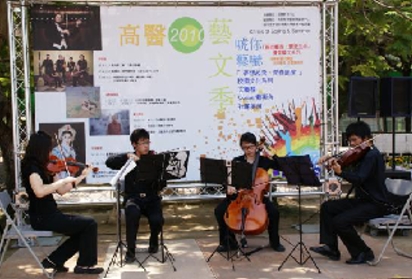Goals
Center for General Education, originated from the Common Course Program of the Office of Academic Affairs, was established in 1999 while Kaohsiung Medical College expanded into Kaohsiung Medical University. It is important to note that the curriculum is planned and designed following five key objectives: life ethics, humanities, social care, global perspectives, and life-time learning. The educational policies and strategies are constantly adjusted along with the rapidly changing society, developing knowledge, and the greater world outlook.
Missions
From the academic year 2013, we will thoroughly incorporate freshmen into KMU’s college education, with the president as the head of college, leading instructors and assistants of the college to build the ambiance of holistic education. We employ the learning activities of formal and informal courses, and complement them with high-level dormitory life, and at the same time expand the learning aspects of life, so that students can obtain the ability of caring for themselves and further it into caring for others. Students are expected to achieve empathy, and actualize this quality in their school life. We are looking forward to cultivating proficients who are equipped not only with the professional learning of medical education, but also the humanity concerns of liberal arts, fully practicing the core value of KMU.
Accomplishments
Students in Kaohsiung Medical University are required to earn 28 credits in general education curriculum except for professional courses in their departments. The courses for Fundamental Education Curriculum are mandatory while the courses for Liberal Education Curriculum are optimal.
1. Fundamental Education Curriculum (known as Fundamental Required Courses) aims to enhance students’ basic skills, for example, students’ attainments in native culture and proficiency of foreign language and information skills. It means that both internationalization and localization are taken into consideration and that would lead to increase students’ future employment rate and international competitiveness.
- ) Among Fundamental Education Curriculum, the service-learning course is an academic arrangement which lasts an academic year and is made possible by our center combining many local medical and social welfare institutions and grassroots charities, which will be the sites for practical training for our students later. This course emphasizes doing and learning that help students objectively comprehend people’s mentality being cared for through practice to physically experience and observe the internship site more detachedly before they become a professional. Consequently, they know what they should reflect on the panel discussion in the future and realize the true meaning of service through practice, which enhance their inter-personal communicative skills and group collaboration, constructing truly internalized altruistic spirit and humanity essence.
- ) As for language learning, diverse activities and self-learning facilities, such as English Corner, English Clinic, Cultural Lectures, English Corner, and Self-learning Center are provided to strengthen students’ competence of language and cross-cultural communication.
2. Liberal Education Curriculum (known as Liberal Elective Course) emphasizes the refinement and continuity of curricular content. The curriculum is officially divided into Core, Advanced, and Auxiliary Course; moreover, seminars and act activities as the extended curriculum are held irregularly
- ) The Core Course aims to develop students’ core skills in holistic education and so an interdisciplinary curriculum is designed. Seven fields, including Citizenship, Globalization, Thinking and Inferring, Classic Civilization, Aesthetic Appreciation, Social, Technological and Science, and Natural Exploration are encompassed.
- ) Advanced Course is mainly projected by seven colleges in our university. So far as “Advanced” is concerned, we emphasize the integration of professionalism and general knowledge in order to develop general courses with college-specific characteristics. In view of medical concerns about life quality and personal dignity, each of the seven colleges is equipped with an advanced course related to life ethics, and the majority of departments list this course as a prerequisite.
- ) The Auxiliary Course combining specialization and general knowledge increases student’s competitive capability in career market and society. It offers a great opportunity for individual student to map out his/her career planning and realize, moreover, associate his/her studies with future career.
3. From the academic year 2013, we will thoroughly incorporate freshman into KMU’s college education, with the president as the head of college, leading instructors and assistants of the college to build the ambiance of holistic education. We employ the learning activities of formal and informal courses, and complement them with high-level dormitory life, and at the same time expand the learning aspects of life, so that students can obtain the ability of caring for themselves and further it into caring for others. Students are expected to achieve empathy, and actualize this quality in their school life. We are looking forward to cultivating proficients who are equipped not only with the professional learning of medical education, but also the humanity concerns of liberal arts, fully practicing the core value of KMU.
Education is a life-long process. The whole-person approach emphasized in general education needs to be multi-dimensional. Lifelong learning needs to grow with time. It’s our hope that these reformative curricula can drive more complete general education ideas in our university and help it to be a medical university that cares for life, serves society, and holds international perspectives as per the founding purpose of our university, accomplishing the ideal of holistic education.
